Key takeaways:
- Reparations politics involves both financial compensation and systemic changes to address historical injustices and foster healing.
- Legislative hearings serve as vital platforms for marginalized voices, connecting personal narratives to broader policy discussions.
- Personal storytelling is critical in the reparations movement, emphasizing that individual experiences can significantly influence public perception and policy advocacy.
- The collective sharing of experiences within diverse communities enhances understanding and collaboration, driving the movement for reparations forward.

Understanding reparations politics
Reparations politics is a complex tapestry woven from historical injustices and contemporary demands for justice. I remember attending a community meeting where passionate voices raised questions about what true reparations would look like. Should it only be financial compensation, or does it also require systemic changes to dismantle lingering inequalities?
Furthering this discussion, I’ve seen how the topic can stir deep emotions, especially among those personally affected by historic injustices. Listening to a grandmother share her story about the impact of discriminatory housing policies on her family struck me profoundly. It highlighted how reparations isn’t just about monetary restitution; it’s about acknowledging pain and fostering healing within communities.
Navigating the intricacies of reparations requires us to confront uncomfortable truths. I often find myself wondering, can a society genuinely move forward without addressing its past? Understanding reparations politics means recognizing that it’s not merely an economic issue but a moral imperative that continues to resonate in today’s dialogue about equality and justice.
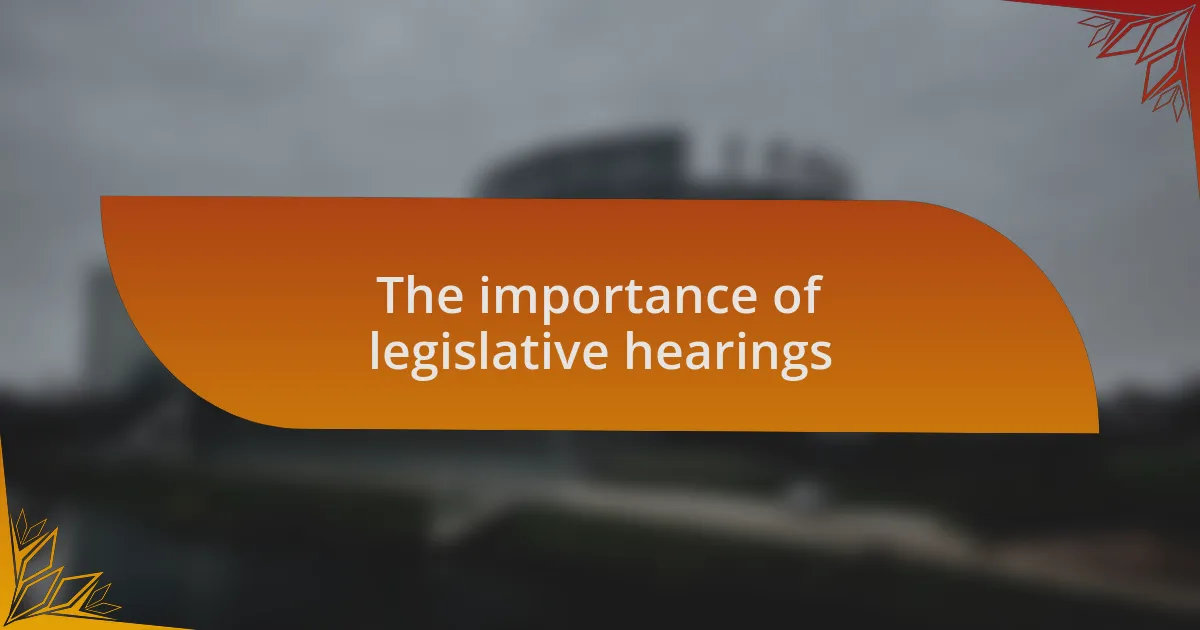
The importance of legislative hearings
Legislative hearings play a crucial role in shaping public policy, particularly on sensitive issues like reparations. I’ve attended a few such hearings, sitting there as lawmakers, advocates, and community members all came together to voice their thoughts. Seeing the mixture of determination and vulnerability among the speakers truly underscored the significance of these forums; they serve as a vital space for amplifying marginalized voices and ensuring that their stories aren’t lost in the shuffle of political agendas.
The emotional weight of these hearings is palpable. I remember one particular session where a young activist shared her family’s struggle against systemic inequality. It felt like a collective breath was held in the room as her words sank in, connecting documented injustices to real-life experiences. This deep connection can only emerge in a setting where legislators are not just hearing statistics but listening to the heart-wrenching narratives behind them.
Through these sessions, lawmakers gain a clearer picture of their constituents’ needs and aspirations. I can’t help but wonder how many crucial decisions are influenced by that raw honesty shared during testimony. When individuals share their truths in legislative hearings, they bring inching accountability to the forefront, pushing society towards a greater understanding of the necessary changes that follow the acknowledgment of historical wrongs.
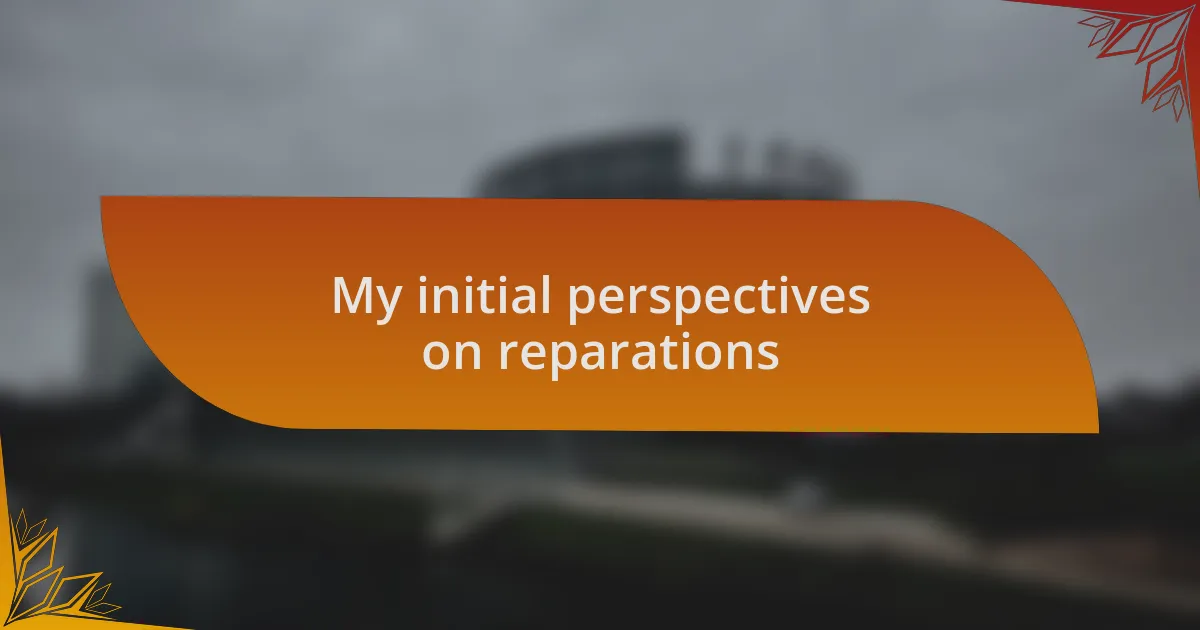
My initial perspectives on reparations
My initial perspectives on reparations were shaped by a mix of hope and skepticism. I often found myself questioning what reparations truly meant—not just in financial terms, but in the context of healing and recognition. When I first attended a hearing on this topic, I was struck by the gravity of the discussions. The idea of reparations is not merely about monetary compensation; it’s about acknowledging the deep-seated injustices and addressing the scars they leave behind.
I still remember a conversation with a friend, who candidly shared how her family had been affected by systemic racism for generations. Hearing her story hit close to home and made me realize that reparations can serve as a bridge for dialogue and understanding. Could it be that by recognizing past wrongs, we open the door for true reconciliation? This sparked a fire in me; I started to believe in the potential for reparations to facilitate genuine change, beyond just financial reimbursements.
As I continued attending hearings, I witnessed a blend of passion and pain in the testimonies presented. Each story relayed not only a history of suffering but also a desire for dignity and respect. I began to see reparations as a step toward rebalancing societal scales, where acknowledgment leads to action. Is it too lofty to think that reparations could catalyze a shift in perceptions and relationships within our communities? I find myself increasingly convinced that the conversation around reparations is not just necessary but essential for a healthier future.
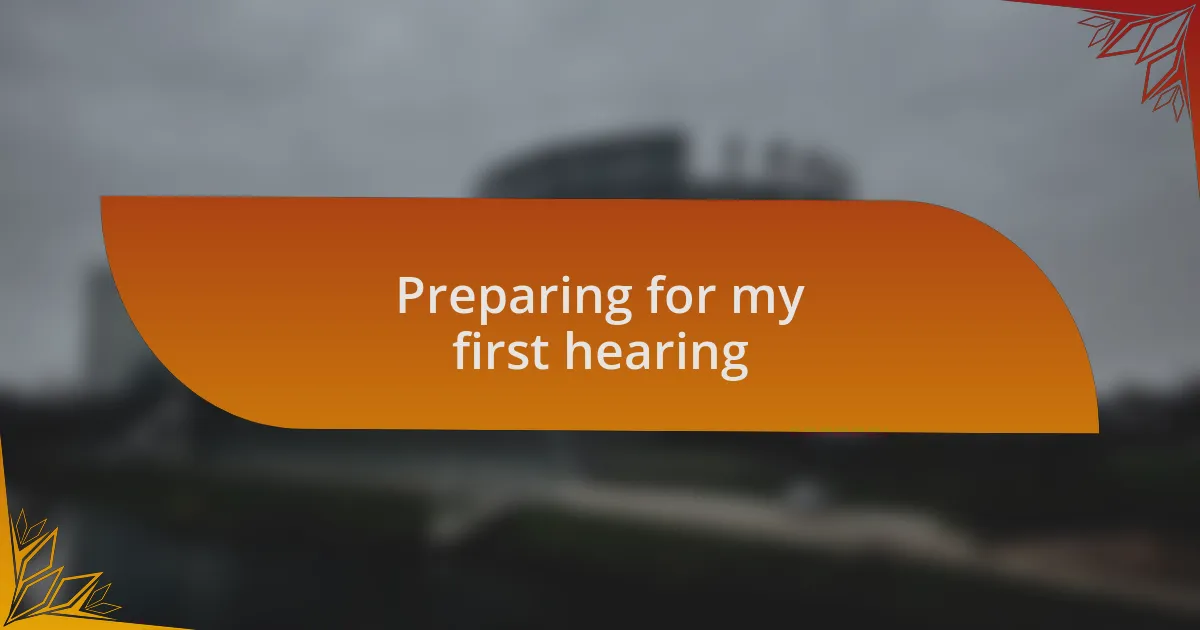
Preparing for my first hearing
Preparing for my first hearing felt like stepping into uncharted territory. I remember meticulously researching the key points I wanted to address, but what lingered in my mind was the weight of the stories I would hear. How could I truly prepare for the emotional intensity of these accounts? The reality hit me harder than I expected—this wasn’t just a debate; it was a profound journey through pain and resilience.
On the day of the hearing, my stomach churned with anticipation and anxiety. I felt a mix of determination and vulnerability. As I watched others speak passionately about their experiences, I realized that preparation went beyond facts. It was about being mentally and emotionally equipped to engage with the raw truths unfolding before us. Would I be able to maintain composure while grappling with such heavy narratives? That uncertainty hung in the air, fueling my resolve to listen deeply.
Reflecting on my preparation now, I recognize the importance of self-care in these moments. I learned to allow space for my emotions, knowing that holding space for others’ experiences is essential. Each testimony became a part of my own journey, nudging me toward deeper empathy. The question lingered: could my vulnerability contribute to a larger movement for justice? I hoped so, because I knew that change often begins with a single, heartfelt conversation.
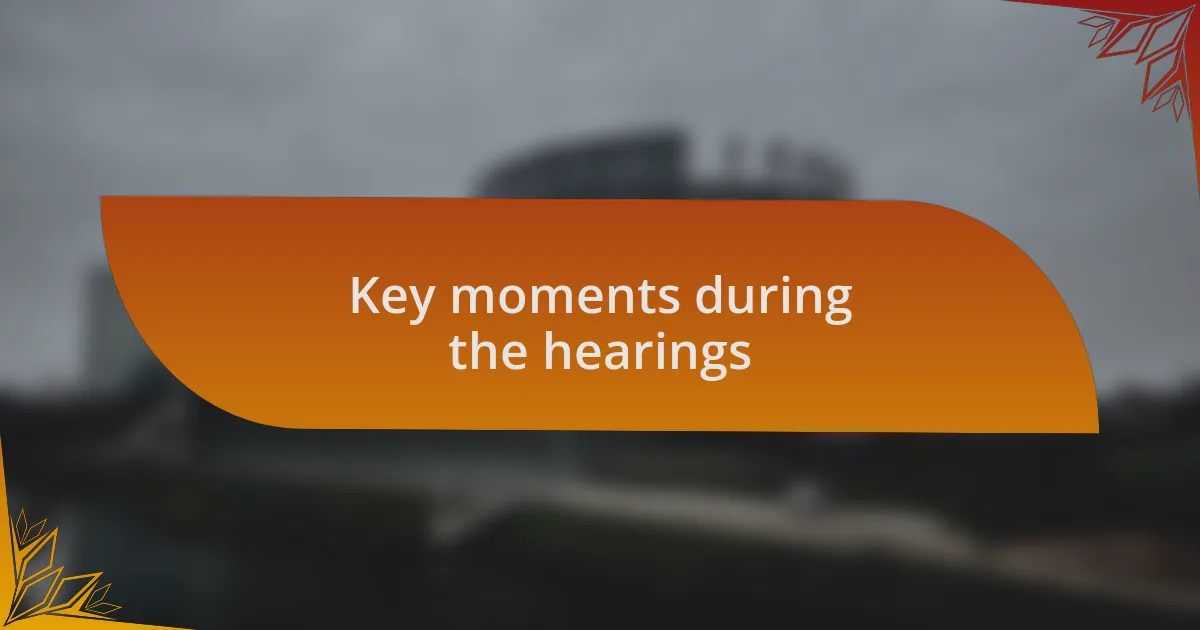
Key moments during the hearings
Witnessing the testimony of a descendant of a survivor felt like a pivotal moment during the hearings. Their voice quivered yet resonated powerfully as they recounted their family’s struggles. I could hardly breathe as they shared their journey through generational trauma—how their family’s fight for dignity was not just personal but echoed the plight of many. In that moment, I understood that these hearings were not just about policies; they were about the real people whose lives were intertwined with our history.
Another unforgettable moment came when an expert witness presented startling research on the economic disparities rooted in the legacy of slavery. I remember thinking, “How can we ignore this data any longer?” The room fell silent; the numbers painted a devastating picture that was hard to deny. It was a call to action, and I felt a surge of responsibility to ensure these findings reached broader audiences. This was not merely an academic discussion; it was an urgent plea for justice that echoed within me.
Perhaps the most moving experience was when community activists shared their visions for reparations, a blend of emotional appeals and grounded proposals. As I listened, I couldn’t help but reflect on my own hopes for the future. Their passion ignited a fire within me, making me question what role I could play in this movement. Were these collective dreams of healing and restoration merely lofty ideals, or could they translate into real policy changes? It was a transformative moment that highlighted the profound impact of grassroots activism in shaping the narrative around reparations.

Lessons learned from my experience
The most significant lesson I learned is the power of storytelling in shaping policy. I vividly recall an intimate conversation with a fellow attendee who shared her grandmother’s experience of displacement. As she spoke, I realized that these personal narratives are the backbone of the reparations movement. It made me question: how have I shared my own family’s story, and could it influence others in our quest for justice?
Another takeaway was the importance of patience and persistence. During a particularly long series of testimonies, I noticed how easily some attendees grew frustrated with the slow pace of change. Yet, I also saw advocates who remained steadfast in hope, reminding me that meaningful progress takes time. It struck me: could my frustration be transformed into advocacy? This shift in perspective helped me understand that every small step taken is part of a larger journey.
Finally, I learned that collaboration is essential. One afternoon, I had the opportunity to coalesce ideas with individuals from diverse backgrounds. What struck me was how our differing experiences enriched our discussions. It led me to ponder for a moment: how can we effectively blend our voices for a more impactful resolution? This experience truly reinforced my belief that unity, even amid diversity, creates a powerful force for change.
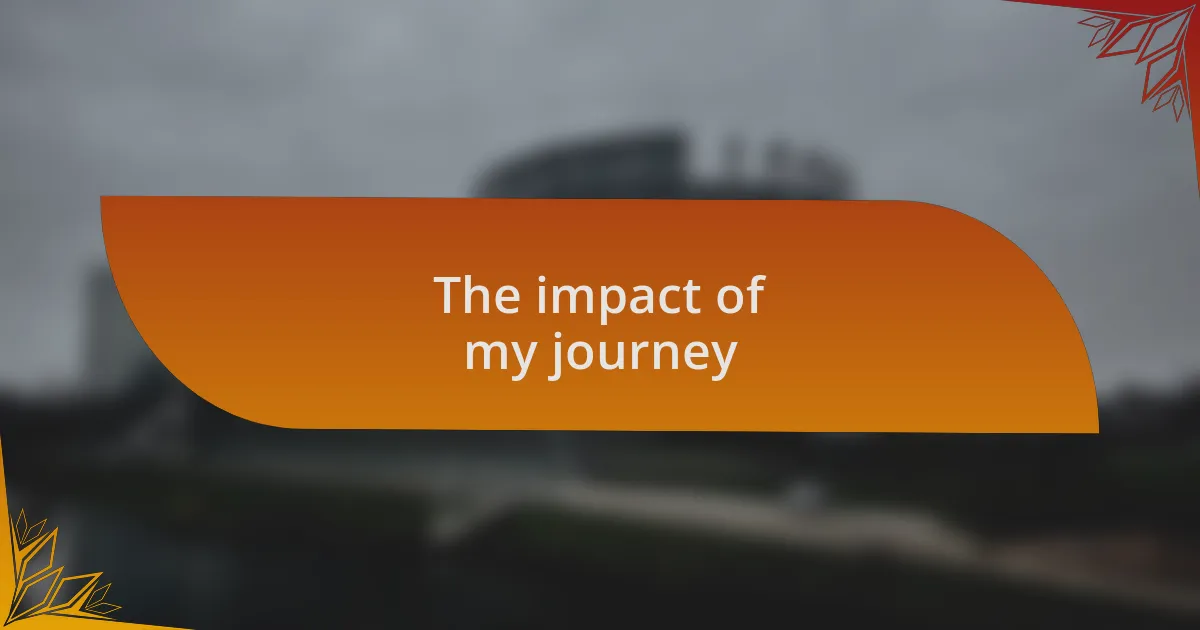
The impact of my journey
The impact of my journey goes beyond what I anticipated. After sharing my own family’s history during a hearing, I felt a profound connection with the audience. One attendee approached me afterward, her eyes filled with tears, and said that my story resonated with her own struggles for recognition. It struck me then: how many others are yearning for acknowledgment? This realization reaffirmed my belief in the importance of vulnerability in advocacy.
Meeting with others who are passionate about reparations transformed my perspective on community engagement. In one meeting, we discussed the intersectionality of our experiences, and it dawned on me that my individual journey is part of a tapestry of shared struggles. I remember thinking, how can we weave our stories together to create a stronger narrative? This collective insight not only deepened my understanding but also fueled my commitment to the cause.
Ultimately, my journey has ignited a fire within me to be more active in the legislative process. Witnessing the direct impact of grassroots efforts during the hearings made me realize that I can’t just be an observer; I need to be a participant in this transformative movement. It leads me to consider: what kind of legacy do I want to leave for future generations? This question continues to motivate me as I realize that each of us has a role in shaping the path toward justice.